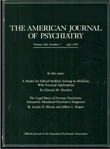This book comes highly recommended by the experts. Such notables as Kihlstrom of Yale, Loftus of the State of Washington, and Gudjonsson of London provide critical acclaim in blurbs on the dust jacket. However, it is one of the least rewarding books that has crossed my desk in recent years. The authors, both former presidents of the Australian Psychological Society, cannot themselves be accused of promising too much. They write in their introduction, “In researching the cases we present in this book we became acutely aware of how inconclusive and frustrating work in investigative hypnosis can be.” They reiterate these words in their concluding chapter, and one can only agree with them. The authors belong to the growing school of academics whose careful research demonstrates the limitations of memory as a veridical record. Unfortunately, they write with such a pedantic and bloodless style that they manage to frustrate the reader with the inconclusiveness of their project.
The authors do not attempt a comprehensive review of the uses of hypnosis in forensic settings. Instead, they discuss cases about which they had direct knowledge. This hands-on clinical approach sounds promising, but even when the cases are potentially interesting, their accounts are neither deep nor informative. In several of the cases, which apparently were notorious in Australia, it is unclear what direct contact, if any, the authors had with the clinical subjects.
The first chapter briefly surveys the case law in Australia dealing with memory recovered under hypnosis. No real attempt is made to relate that material to American legal developments, which are complex and have produced a considerable commentary. The authors seem to be explicitly writing for an Australian audience of lawyers and law enforcement officials who have no psychological expertise.
The case material begins with reports of three egregious examples of forensic abuse of hypnosis. One involves leading questions about supposed sexual abuse in an Australian day care center. The hypnotic session of the 3-year-old child was carried out by a policewoman demonstrably lacking professional skill, judgment, or human kindness. The other two cases provide a naive reader with similarly extreme examples of biased inquiries, but they are so egregious that beyond their shock value they offer little instructive guidance to mental health professionals.
With the background of these cautionary tales, the authors suggest quite reasonable guidelines for the forensic use of hypnosis. They emphasize the importance of independent corroboration of accounts given under hypnosis. “Its use is not to elicit material that cannot be corroborated in any way” (p. 48). They also emphasize the importance of the professional qualifications of the hypnotist. They go on in the same chapter without any warrant or foundation to propound forensic guidelines for all recovered memories, although in this book the case material is entirely about memory retrieved under hypnosis.
The authors circle around the important ethical problems without shedding new light. For example, the key issue in forensic ethics is the clash in professional values between eliciting the best evidence necessary to do justice and the injunction against doing harm to patients. The authors, who are obviously both sophisticated and cautious, recognize the problem but get no farther than redescribing it.
There are cases in this book that raise intriguing questions: Do we employ investigative hypnosis in the case of a woman who claims that she was raped by a man who used hypnosis to make her submit? Do we believe the claim? Can an investigator distinguish between hypnotically recovered dreams and memories? These cases are never explored in depth or discussed with clinical sophistication, however. The meat of the book consists of 25 pages summarizing laboratory research relevant to forensic hypnosis. Most of it has been reviewed more extensively elsewhere by these and other authors. If there is any overall lesson, it is that hypnosis is unlikely to be a major asset in criminal investigations. In the search for truth in the courtroom, the experts now agree that both the risks and benefits of hypnosis have been oversold. This book seems to have had two underlying purposes: to survey the state of the forensic practice of hypnosis in Australia and to get the Australian police out of the business of using hypnosis themselves to pursue criminal investigations. These are not good reasons for American psychiatrists to add this otherwise disappointing book to their libraries.

